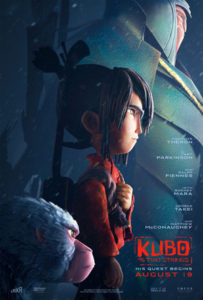Starring the Voices of: Charlize Theron, Art Parkinson and Ralph Fiennes
Directed By: Travis Knight
Rated: PG
Running Time: 101 minutes
Focus Features
Our Score: 4 out of 5 Stars
Anymore, I’m shocked when I walk out of a movie after seeing something original. I was almost certain that “Kubo and the Two Strings” was based on a book or short story. I was sure that a movie utilizing origami, ancient traditions, and the mysticism of the Eastern world, was someone else’s idea come to life. Nope. The ambitious nature of the film is all its own and it’s amazing to see the animation studio, Laika, put so much faith behind it.
To say that “Kubo” is a kid’s movie or fun for the whole family would be a disservice. It seems more interested in a mature audience that fancies itself as fans of anime, late 70’s kung fu, or people who watch “Adventure Time”. So if anything, you could say it’s a very mature kid’s movie. It doesn’t have predictable silliness, but seems to find itself bordering on family friendly entertainment early on when we meet our hero, Kubo (Parkinson). He’s forbidden from staying out past dark by his near comatose mother.
Kubo spends his days going into town to make money by plucking the two strings on his shamisen (or guitar). Through his musical talents, he’s able to wield magic that puppets different origami creatures, while spinning tales that are inspired by his father, whom he’s never met. He fascinated with the journey of great samurai warrior, and the beasts and monsters they fight. Inevitably after one of his shows, he stays out past dark, invoking his evil twin aunts (voiced by Rooney Mara), sending him on his own perilous journey.
Kubo joins forces with a talking monkey voiced by Charlize Theron and a beetle warrior voiced by Matthew McConaughey. It took me a while to get on the same page as “Kubo” and a lot of that may be because I wasn’t sure what to expect. The movie’s marketing campaign made it feel like I was in for a Japanese rehash of “James and the Giant Peach”, but there’s a lot more depth and heart to “Kubo” than any Roald Dahl classic.
Without revealing too much, the heart and soul of this movie is about the family unit, forgiveness, memory and the damage jealousy can bring upon the human soul. It has some great lessons for kids, but its more heart felt for older audiences who have aging patriarchs and matriarchs at home. “Kubo” is a clash of youth and age, and how families handle the generational divide within their own families. “Kubo” does suffer from an identity crisis, having to balance audience expectations and preventing its mature script from tripping into low-brow kid’s movie pitfalls. I’m sure “Kubo” will get better with age.
The digital stop-motion animation in “Kubo” is next level. A good chunk of scenes are on the same level as most stop-motion movies, but other scenes are breathtaking and groundbreaking. I’m no animator, but I’m sure most out there will have to give pause and wonder how “Kubo” accomplishes many of it’s visual feats. There’s so much for your eyes to feast on, at times the story becomes second nature to everything happening on screen, like a scene where a sailboat made up of Autumn leaves crashes through the waves of a lake during a robust lightning storm.
“Kubo” is clearly a passion project, with a dedicated team behind the camera. It hits deep within the heart for those looking for meaning, but lacks the right amount of force to really do some emotional damage once it’s driven into your soul. There’s a lot of themes, some blatant, some yet undiscovered on my first viewing. “Kubo” will surely be keeping Disney and Pixar on the edge of their seat come award season. Laika Studios is proving to be a worthy adversary and showing that stop-motion can be just as colorfully lively, emotionally heartbreaking and creatively inspiring, than a lost fish in the sea or what your pets do while you’re at work.


